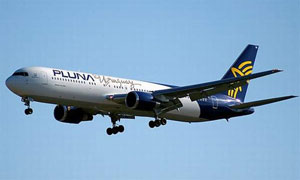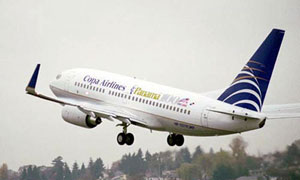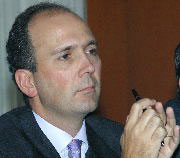AITAL
Conference Attracts 400
  AITAL,
the International Latin American Air Transport Association, held its second
annual Conference last December at the Turnberry Resort in Aventura, Florida,
attracting some 400 delegates from 29 countries. AITAL,
the International Latin American Air Transport Association, held its second
annual Conference last December at the Turnberry Resort in Aventura, Florida,
attracting some 400 delegates from 29 countries.
The Conference focused on recent developments in aviation
and their effect on Latin and South American carriers, suppliers and manufacturers.
 Juan
Emilio Posada, the current AITAL President, emphasized the growth in Latin
American aviation in terms of passenger traffic and revenues. Juan
Emilio Posada, the current AITAL President, emphasized the growth in Latin
American aviation in terms of passenger traffic and revenues.
While Latin American carriers are safer
than ever, airport landing fees remain higher in Latin America than elsewhere
in the world.
Additionally, airlines are being burdened
by significant taxes imposed by governmental authorities, most of which
taxes are used to fund non-aviation projects.
Airlines are also being charged with the
cost of security which, according to Mr. Posada, should be borne by the
governments involved, not by the airlines and their passengers.
Tom Windmuller of IATA emphasized the extraordinary
changes in the air transportation industry over the past four years. While
United States carriers will sustain $10 billion in losses in this year,
profits in other sectors of the world, notably Asia and Europe, will make
the net loss to the aviation industry some $6 billion.
One positive sign in the aviation industry
is that global air cargo traffic increased in 2005. Since cargo is a leading
economic indicator, this bodes well for the aviation industry.
However, Mr. Windmuller stressed “we
have passed the peak of passenger traffic growth” and IATA predicts
5.6% growth in passenger traffic between the years 2005 and 2009.
Mr. Windmuller also indicated that the year
2004 was the safest ever for aviation. On the downside, some 40% of Latin
and South American carriers fall into Category II criteria for safety
and do not meet all international standards.
Mr. Windmuller also discussed the current
“black listing” by the European Union of certain airlines
which are felt not to be up to international safety standards. “Blacklists”,
it is believed, are a political rather than a safety issue.
In order to improve the competitive atmosphere,
Mr. Windmuller stressed five points that are needed to bring health, stability
and growth to the aviation industry. These include competitive law, avoidance
of micromanagement of airlines by governmental authorities, failed privatizations,
fewer taxes and liberalization.
With respect to competitive law, airline
fares, which have recently dropped as much as one-third, have never been
lower. Governments of the world should allow privatization and mergers
to bring additional benefits to consumers in the form of lower ticket
prices.
With respect to micromanagement, there has
been too much regulation of the air carrier industry, particularly by
the European Commission. The compensation required to be paid by carriers
to passengers for flight delays is extremely costly.
In Mr. Windmuller’s words, requiring
airlines to pay compensation for delays in flights does nothing to improve
the weather, which is the main cause of flight delays in Europe.
Failed privatizations have also hurt the
aviation industry. Since 1999, when Argentina privatized its airport system
and charged extremely high rent payments, these taxes have been a burden
on the airport authorities who have passed these charges along to lessees
who simply cannot pay them.
Air transportation is a fundamental economic
tool which promotes growth throughout the world. Air travel should not
be viewed as a subject of “luxury taxes”. Without investment
in the infrastructure of airports, the airline business will simply dry
up. Any taxes collected from airlines must be reinvested in the aviation
industry.
Finally, with respect to liberalization,
airlines should be allow to merge, add new routes, drop unprofitable routes
and take all of the other steps that a reasonably prudent business might
take in order to maximize its revenues.
Looking to the future, IATA envisages 100%
e-ticketing by the end of 2007. IATA will stop printing tickets by the
end of 2007 and $3 billion in cost savings will be realized by the elimination
of paper ticketing. In the United States, over 63% of airline tickets
are now issued on-line.
E-commerce is also expected to spread in
the cargo field and the goal is to have a paperless air cargo industry
by 2010. The average air cargo shipment consumes 38 pieces of paper, the
weight of which would fill 39 Boeing 747 aircraft on an annual basis.
IATA estimates that the elimination of paper
from the cargo process will eliminate $1.2 billion in costs. One other
way of eliminating and reducing costs in connection with air cargo is
to have countries of the world sign both the Montreal Protocol No. 4 and
the Montreal Convention.
While the United States is a party to both
of these agreements, many Latin and South American carriers are not and
both these agreements must be executed in order to make paperless cargo
a reality in the future. (Michael Holland)
|



